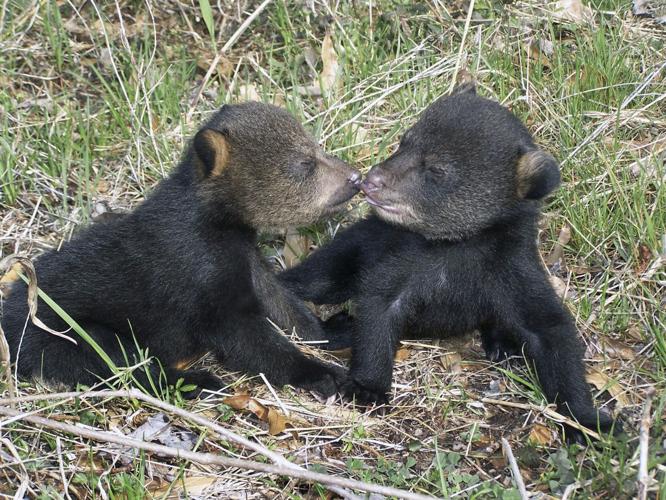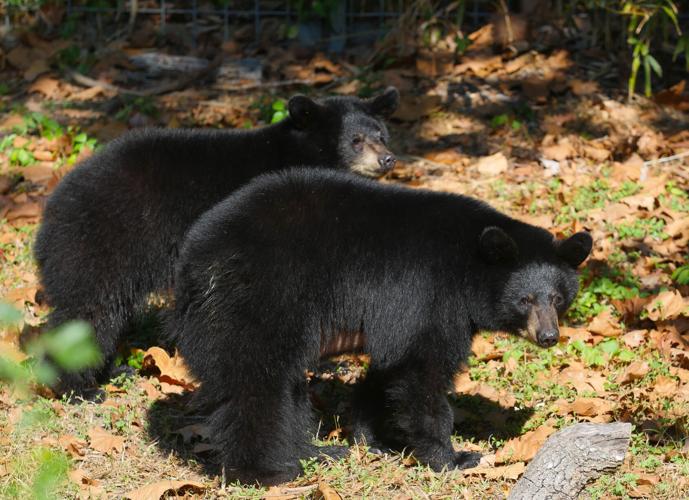Harold Schoeffler and Rep. Neil Riser are both native Louisianans. In the state known as “Sportsmen’s Paradise,” both are hunters.
But in the 1980s, Schoeffler, a Cadillac dealer from Lafayette, petitioned the federal government to list the Louisiana black bear as endangered, and has fought to protect the animal ever since. Riser, on the other hand, believes the bear has made enough of a comeback for the state to reestablish a limited hunting season.
At the behest of the Louisiana Department of Wildlife and Fisheries, Riser has filed a bill to support that aim. House Bill 684, which state lawmakers are slated to consider during the ongoing legislative session, authorizes the state to create a lottery for bear hunting permits.
The move would come eight years after the federal government removed the animal from its endangered list and declared it recovered.

A bear is seen walking in a sugar cane field near Franklin, La. on Tuesday, August 21, 2018.
“We’ve cleared all the federal obstacles,” Riser said. “Now we’re eligible … (to) have a bear season.”
Though the bill does not specify how many annual permits the agency would issue, Riser said the number would be limited, in line with the department’s recent pitch to allow 10 bears to be hunted in December in the northeast portion of the state. (In the future, that number could fluctuate depending on population estimates.)
Still, Schoeffler and some others say there are still too few bears to justify slaying even a few. The state Department of Wildlife and Fisheries knows of about 1200 black bears in the state, and estimates their total population is closer to 1500.
“You might have a female that might go through five birth cycles. You kill her, you really have an impact on the population,” Schoeffler said. “I’m an avid hunter, but I don’t think we should hunt the bear when we have 1200.”
The original Teddy bears
The Louisiana black bear, a charismatic, big-eared subspecies of American black bear that inspired the design of the Teddy bear, was on the brink of extinction by the mid-1980s, when its population was estimated to be between 80 and 120, according to a state report.
Thanks to efforts by Schoeffler, including a lawsuit, the federal government listed the bear as endangered in 1992.
In 2016, when the bear’s estimated population had reached about 700 individuals, the federal government removed that designation, a decision that sparked litigation by advocates who said the bear’s survival remained tenuous and the subspecies should not lose its protected status.

Harold Schoeffler, who is opposed to allowing bear hunting in the state, stands for a photo at his house on Friday, March 15, 2024 in Lafayette, La..
The litigation failed, and last year the state Department of Wildlife and Fisheries came out with its plan to launch a 2024 bear hunting season.
The plan would ban the killing of cubs and of mothers with cubs. It would designate some permits for landowners or for hunters who coordinate with them. Private landowners also could sell their permits, a plan Cathey said is meant to help them recoup losses for property destruction by bears.
If passed, HB 684 would allow the department to establish a lottery for the permits with a $50 entry fee. The agency, or a conservation nonprofit it designates, also could auction off one permit to the highest bidder.
Sen. Stewart Cathey, R-Monroe, has worked with Riser and Sen. Jay Luneau, D-Pineville, on the bear hunting proposal. The idea was prompted by complaints that the bears were becoming a nuisance, Cathey said.
“This is all in response to calls that we’ve all received from landowners, farmers as a result of just the overwhelming population of bears in various spots across the state,” Cathey said.
Critics: Population still recovering
But conservationists and a group of hunters from Cajun country say the state should hold off. Even as north Louisiana farmers have reported a rash of bear sightings, Dean Wilson, executive director of the preservationist nonprofit, Atchafalaya Basinkeeper, said he has hardly ever seen bears near the basin.
“You don’t have enough Louisiana black bears to justify losing genetic material of the bears, even a small amount,” said Wilson, an avid hunter and fisherman.
Now isolated to a few distinct populations, the Louisiana black bear once roamed the entire state, according to range maps from the North American Bear Center. In addition to overhunting, habitat loss and vehicular killings have been its main threats.
Ron Nowak, a former U.S. Fish and Wildlife Service zoologist who worked with Schoeffler to get the bears listed as endangered, said the bears also face a genomic threat: In the 1960s, the state introduced a group of American black bears from Minnesota to Louisiana. Those bears’ descendants live in Upper Atchafalaya and have mixed little with Louisiana bear populations in Lower Atchafalaya and the Tensas River basin, according to a 2018 research paper penned by several biologists.
Because the Upper Atchafalaya bears are not descended from the Louisiana subspecies, Nowak disapproves of the state’s inclusion of the Upper Atchafalaya bears in its total population count, he said.
State makes a case
In a statement, the state Wildlife and Fisheries Department said it was not concerned about hybridization among the bear populations, and that genetic diversity would be helpful to the subspecies.
Because the Minnesota population was introduced 60 years ago, the statement said, it is now considered part of the broader Louisiana bear population. (An author of the research paper could not be reached for comment on whether the Upper Atchafalaya bears are considered a Louisiana subspecies.)
“Our black bear habitat and subpopulations are stable and growing, with our best bear habitat being well populated with bears,” department officials said. “An adult may have a home range of 125 square miles, so any parish in the state could have a bear on any given day.”

State Sen. Neil Riser, R-Columbia, talks with elections officials as he registers to run for state treasurer on Wednesday in Baton Rouge. (Photo by Melinda Deslatte, The Associated Press)
While lawmakers don’t need to sign off on a new bear hunting season, they do need to agree to let the state charge a bear permit fee, money that would go toward managing the black bear population, officials said.
Riser and other supporters of a bear hunting season argue hunters, by paying permitting fees, help the state fund efforts to protect animal populations., are key to conservation efforts.
“The hunters are the greatest conservation involved,” Riser said. “Hunters are going to make sure that there’s game there to hunt.”
Others find the prospect of hunting the bears harder to stomach. After such a long preservation fight, Schoeffler said it is difficult to think that a hunting season might be on the horizon.
“When you see what happened to the bison, you can see the bear going down the same road,” he said.






